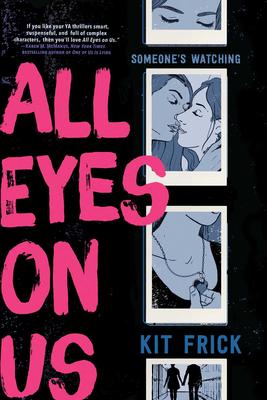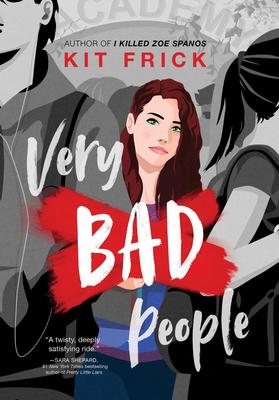




“Writers are not always comfortable talking about failures and disappointments – when things don’t work out or are hard” comments author Kit Frick. Yet, Ms. Frick was quite candid that she was “not alone in being a writer struggling with creativity…especially in the early months” of Covid. Had it not been for that struggle and failure/disappointment, her newest book Very Bad People would not exist – and that would be very bad indeed! Unfortunately, I Killed Zoe Spanos was released June 2020 and all publicity events were canceled. While some were switched to a virtual setting, “the hardest part of that release was not getting to connect in person with teen readers.” However, a “really great thing” that happened was opportunities to provide 20 minute video chat Q&A sessions to school and libraries. Another very good thing happened after failure/disappointment. Two years ago, this author was working on another book and she was “unhappy in revision” with it, noting that it was “possibly a pandemic casualty… It just wasn’t coming together.” However, she is “so glad” she made the “difficult decision at the time to shelve a book that had been drafted [and] revised several times.” Her editor “was happy” but she was not. Although she “felt like a failure at the time,” it was “worth the wait” to have Very Bad People come out in 2022 instead of the other book at an earlier date.
After the “long drawn out revision struggle” on the other book, once Ms. Frick “finally made the decision to set it aside, and dive into” what became Very Bad People, the writing process was rather short. She spent two months to “brainstorm, figure out what I really wanted to write; I didn’t want another false start.” For this book she ended up outlining and drafting simultaneously, although her writing process is a bit different for each book. Ordinarily, she is a “big plotter, outliner. Especially because I write books with mysteries, it’s become increasingly more important to me with every book to have a fleshed out outline, to have a really good sense of where I’m going plotwise.” Yet, as “I get to know my character better through the drafting process,” she winds up deviating from the outline; “I do feel that my characters drive my drafting process.” The book she is now working on requires “a big excel sheet” to help her keep it all organized. The writing process for Very Bad People felt like a “gift from the universe after the painful drawn out” prior book. She hopes, as you will too if you read Very Bad People, that there will be a sequel. She believes one common misconception about being a writer is that “to be a writer…you must write every day. That is categorically untrue. There are many ways to be a writer, whether it’s a hobby or professionally, that do not involve daily writing.”
Ms. Frick has a day job which allows her limited time during the week to write plus “at least” one full day on the weekend. “I’m very lucky to have day job that I’m very passionate about and that is also creative but in a different way from writing.” By day, she is a “chapbook” editor for Locked Horn Press. Ms. Frick explained that a chapbook is a short collection of poems – “that’s the easiest definition.” If a book is at least 48 pages, it is generally considered full length. Up to approximately 40 pages is generally considered a chapbook. For this author, one of the many “cool” things about chapbooks is that they are “usually done by small presses or independent publishers. The production of a chapbook can range anything from hand stitched, completely handmade artist books to regular paperback, perfect bound, printed at a printer with an ISBN.” She collects them “in all different shapes and sizes and materials – the visual aesthetics of a book as an object in addition to the content.”
Ms. Frick started out in poetry and it “was my gateway into writing…Poetry has been with me for much longer than fiction writing has.” Yet, by the time her third book (I Killed Zoe Spanos) came out, “it’s starting to feel not as new as it did when I was a debut [author] a couple of years ago.” Both genres are important to her. She added “I feel lucky to be able to write in two genres; it really opens a lot of creative doors for me.” The two genres “use different parts of my creative brain.” She believes the “generative process” for each is very different, but the revision process is similar. “I’m really tuned into the musicality of the language, the way sentences work together to form a paragraph, rhythm, sentence structure – all of those fine tuning details when I’m working on revision in fiction. I think that my ear from writing poetry comes into play in the revision process.”
When asked why she writes YA, Ms. Frick stated that “I think I still feel very connected to my adolescent self…I think it has to do with being such an emotionally heightened time period in my life and many, many peoples’ lives.” She, like many other YA authors, “grew up at a point that was pre-YA.” She remembers the “teen shelf” having a lot of horror books and “I was a real scaredy cat.” Mostly she read adult novels, though she “did gravitate towards fiction featuring teen protagonists…[such as] The Virgin Suicides (which is very much a novel for adults)” or the memoir Girl Interrupted. A few teen readers have reached out to her about how they connected with a character’s experience from one of her books. “That’s been really important to me because when I am creating these characters, of course I am hoping that they will find resonance for teens too…that’s the best feedback.”
Drawn to reading and writing “thrillers with a balance between entertaining, good stories and that also dig into some sort of issue that is important to me,” as an author, Ms. Frick’s “sweet spot” includes “issues that matter to my target audience and writing really thrilling” stories. She has just started “brainstorming” for her fifth YA novel, and nothing about it has yet been announced. Although she would like to write a dystopian novel, this will not be it. For her, a dystopian novel was her “entry into YA as an age category.” In fact, her first attempt at YA was such a book, and it was “doomed” once the popularity of the genre had risen and fallen. “I would love to play around with dystopian if there ever is a market resurgence again.”
Discussing rejection in publishing, Ms. Frick commented “this is another instance where having been a poet first and submitting work on my own as a poet, so not through an agent where someone else is handling that part of the process, has been helpful.” Without an agent, the writer receives all the decision letters – mostly rejections – directly. “I personally developed a pretty thick skin for rejection long before I got to the point where I was querying fiction.” While rejection still “stings,” it has been “such a present part of my writing journey for so many years now, that just through experience I have come to accept it as part of the process.” Her family also provides feedback, although they are “all my biggest fans.”
As a child, she wanted to be a first grade teacher so she could teach kids reading. She recalls her “amazing first grade teacher, Mrs. Kennon, and learning to read. I can’t think of another educational moment that has had that big of an impact on my life.” By the age of 15, she wanted to do something with story telling, perhaps a professional actor. “As I got into college, I found more creative joy from writing than I did acting… Being involved in the world of storytelling, of connecting to other human beings through storytelling has always been the focus for me.” Activities in high school included theater, gay straight alliance, Amnesty International, playing viola in the orchestra (“I was not very good”), and dancing for PE credit. Ms Frick also had a job serving patrons at a dinner theater. She wishes as a teenager she had known “that people outside of your insular little high school friend group are not bad and scary. I think I spent a lot of time in high school very concerned about what others thought of me and that especially applied to the many people at school that were not part of my little group of friends; I really assumed that everyone was judging me all the time.” She learned as an adult that “in fact not everyone is judging you all of the time.” Ms. Frick does not consider herself famous, or that she has changed significantly as she has become a more published author, and misses connecting to her teen readers.